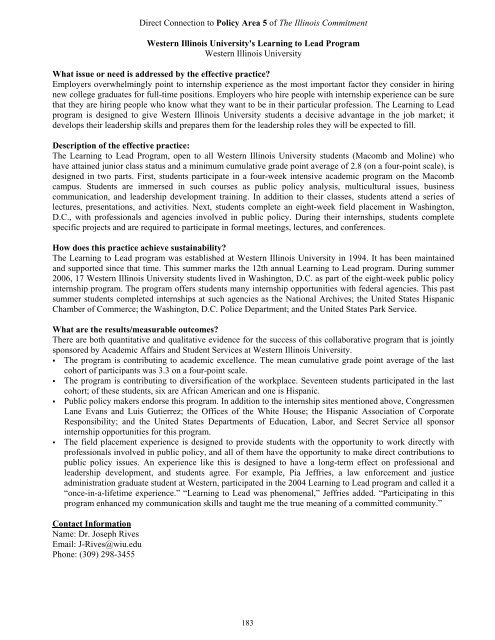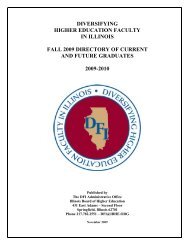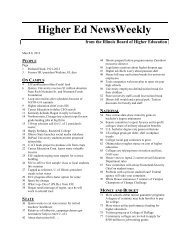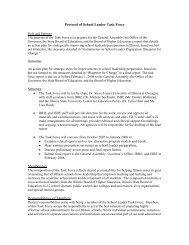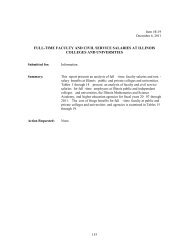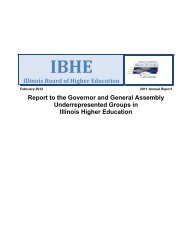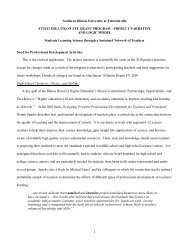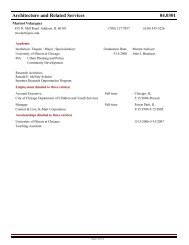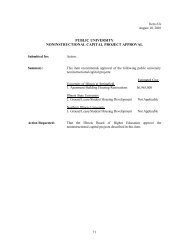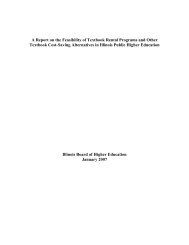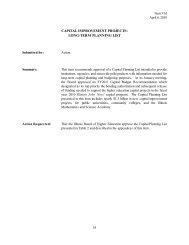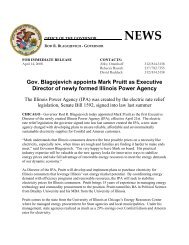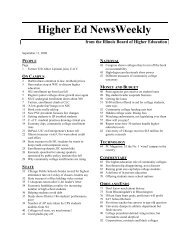Title of Effective Practice: - California Postsecondary Education ...
Title of Effective Practice: - California Postsecondary Education ...
Title of Effective Practice: - California Postsecondary Education ...
You also want an ePaper? Increase the reach of your titles
YUMPU automatically turns print PDFs into web optimized ePapers that Google loves.
Direct Connection to Policy Area 5 <strong>of</strong> The Illinois Commitment<br />
Western Illinois University's Learning to Lead Program<br />
Western Illinois University<br />
What issue or need is addressed by the effective practice?<br />
Employers overwhelmingly point to internship experience as the most important factor they consider in hiring<br />
new college graduates for full-time positions. Employers who hire people with internship experience can be sure<br />
that they are hiring people who know what they want to be in their particular pr<strong>of</strong>ession. The Learning to Lead<br />
program is designed to give Western Illinois University students a decisive advantage in the job market; it<br />
develops their leadership skills and prepares them for the leadership roles they will be expected to fill.<br />
Description <strong>of</strong> the effective practice:<br />
The Learning to Lead Program, open to all Western Illinois University students (Macomb and Moline) who<br />
have attained junior class status and a minimum cumulative grade point average <strong>of</strong> 2.8 (on a four-point scale), is<br />
designed in two parts. First, students participate in a four-week intensive academic program on the Macomb<br />
campus. Students are immersed in such courses as public policy analysis, multicultural issues, business<br />
communication, and leadership development training. In addition to their classes, students attend a series <strong>of</strong><br />
lectures, presentations, and activities. Next, students complete an eight-week field placement in Washington,<br />
D.C., with pr<strong>of</strong>essionals and agencies involved in public policy. During their internships, students complete<br />
specific projects and are required to participate in formal meetings, lectures, and conferences.<br />
How does this practice achieve sustainability?<br />
The Learning to Lead program was established at Western Illinois University in 1994. It has been maintained<br />
and supported since that time. This summer marks the 12th annual Learning to Lead program. During summer<br />
2006, 17 Western Illinois University students lived in Washington, D.C. as part <strong>of</strong> the eight-week public policy<br />
internship program. The program <strong>of</strong>fers students many internship opportunities with federal agencies. This past<br />
summer students completed internships at such agencies as the National Archives; the United States Hispanic<br />
Chamber <strong>of</strong> Commerce; the Washington, D.C. Police Department; and the United States Park Service.<br />
What are the results/measurable outcomes?<br />
There are both quantitative and qualitative evidence for the success <strong>of</strong> this collaborative program that is jointly<br />
sponsored by Academic Affairs and Student Services at Western Illinois University.<br />
• The program is contributing to academic excellence. The mean cumulative grade point average <strong>of</strong> the last<br />
cohort <strong>of</strong> participants was 3.3 on a four-point scale.<br />
• The program is contributing to diversification <strong>of</strong> the workplace. Seventeen students participated in the last<br />
cohort; <strong>of</strong> these students, six are African American and one is Hispanic.<br />
• Public policy makers endorse this program. In addition to the internship sites mentioned above, Congressmen<br />
Lane Evans and Luis Gutierrez; the Offices <strong>of</strong> the White House; the Hispanic Association <strong>of</strong> Corporate<br />
Responsibility; and the United States Departments <strong>of</strong> <strong>Education</strong>, Labor, and Secret Service all sponsor<br />
internship opportunities for this program.<br />
• The field placement experience is designed to provide students with the opportunity to work directly with<br />
pr<strong>of</strong>essionals involved in public policy, and all <strong>of</strong> them have the opportunity to make direct contributions to<br />
public policy issues. An experience like this is designed to have a long-term effect on pr<strong>of</strong>essional and<br />
leadership development, and students agree. For example, Pia Jeffries, a law enforcement and justice<br />
administration graduate student at Western, participated in the 2004 Learning to Lead program and called it a<br />
“once-in-a-lifetime experience.” “Learning to Lead was phenomenal,” Jeffries added. “Participating in this<br />
program enhanced my communication skills and taught me the true meaning <strong>of</strong> a committed community.”<br />
Contact Information<br />
Name: Dr. Joseph Rives<br />
Email: J-Rives@wiu.edu<br />
Phone: (309) 298-3455<br />
183


